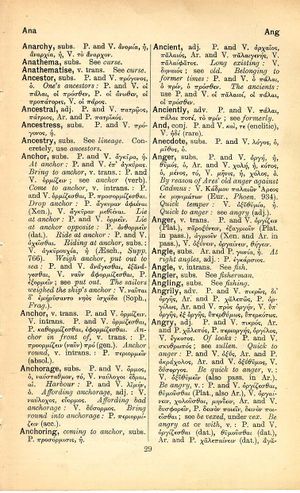anger: Difference between revisions
From LSJ
οὗτος μὲν ὁ πιθανώτερος τῶν λόγων εἴρηται, δεῖ δὲ καὶ τὸν ἧσσον πιθανόν, ἐπεί γε δὴ λέγεται, ῥηθῆναι → this is the most credible of the stories told; but I must relate the less credible tale also, since they tell it
(CSV3) |
mNo edit summary |
||
| Line 4: | Line 4: | ||
P. and V. [[ὀργή]], ἡ, [[θυμός]], ὁ, Ar. and V. [[χολή]], ἡ, [[κότος]], ὁ, [[μένος]], τό, V. [[μῆνις]], ἡ, [[χόλος]], ὁ. | P. and V. [[ὀργή]], ἡ, [[θυμός]], ὁ, Ar. and V. [[χολή]], ἡ, [[κότος]], ὁ, [[μένος]], τό, V. [[μῆνις]], ἡ, [[χόλος]], ὁ. | ||
[[by reason of Ares' old anger against Cadmus]]: V. Κάδμου παλαιῶν [[Ἄρεος]] ἐκ μηνιμάτων (Eur., ''Phoen.'' 934). | |||
[[quick temper]]: V. [[ὀξυθυμία]], ἡ. | |||
[[quick to anger]]: see [[angry]] (adj.). | |||
'''v. trans.''' | '''v. trans.''' | ||
Revision as of 09:02, 23 September 2019
English > Greek (Woodhouse)
subs.
P. and V. ὀργή, ἡ, θυμός, ὁ, Ar. and V. χολή, ἡ, κότος, ὁ, μένος, τό, V. μῆνις, ἡ, χόλος, ὁ.
by reason of Ares' old anger against Cadmus: V. Κάδμου παλαιῶν Ἄρεος ἐκ μηνιμάτων (Eur., Phoen. 934).
quick temper: V. ὀξυθυμία, ἡ.
quick to anger: see angry (adj.).
v. trans.
P. and V. ὀργίζειν (Plat.), παροξύνειν, ἐξαγριοῦν (Plat. in pass.), ἀγριοῦν (Xen. and Ar. in pass.), V. ὀξύνειν, ὀργαίνειν, θήγειν.

